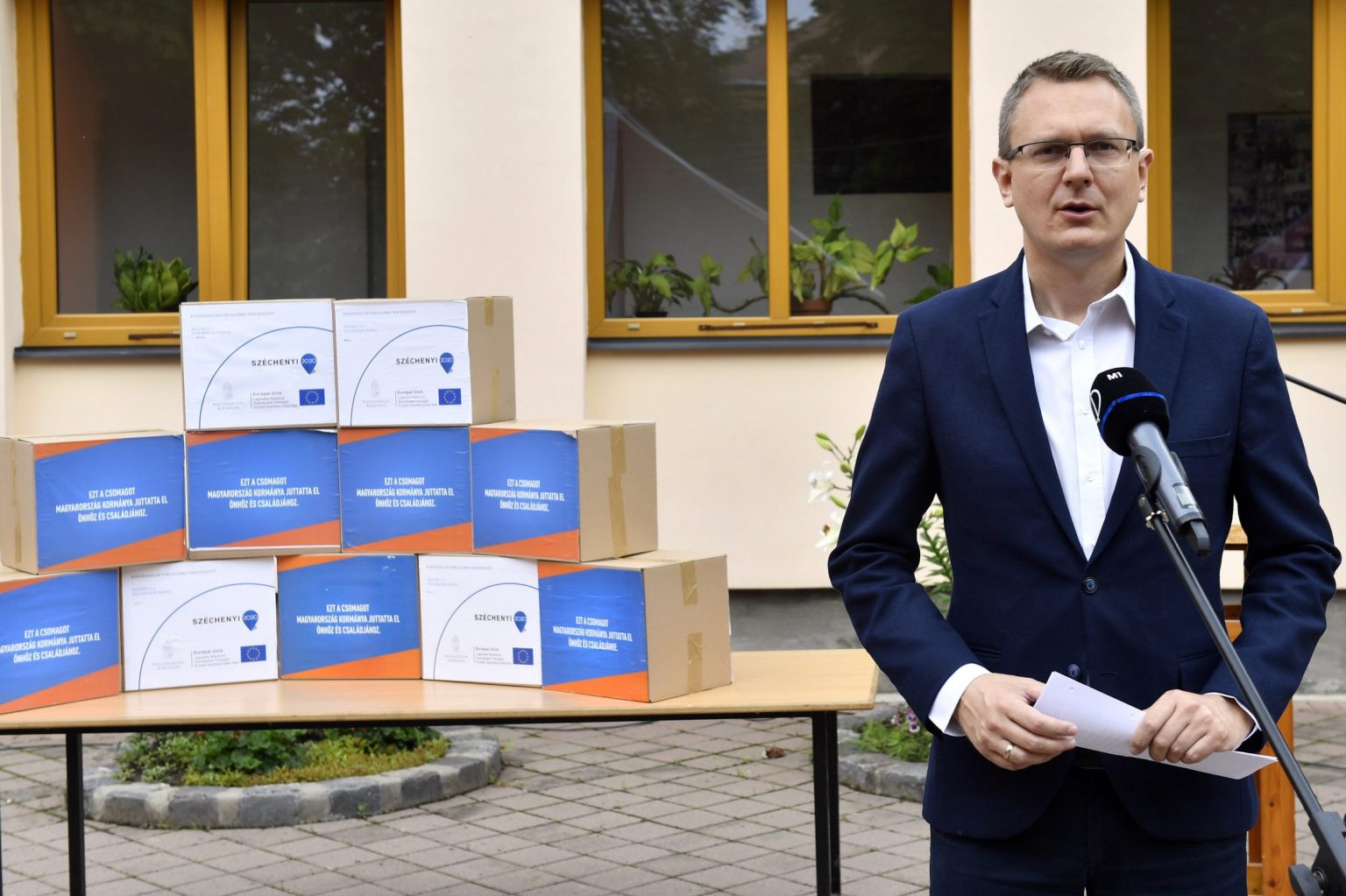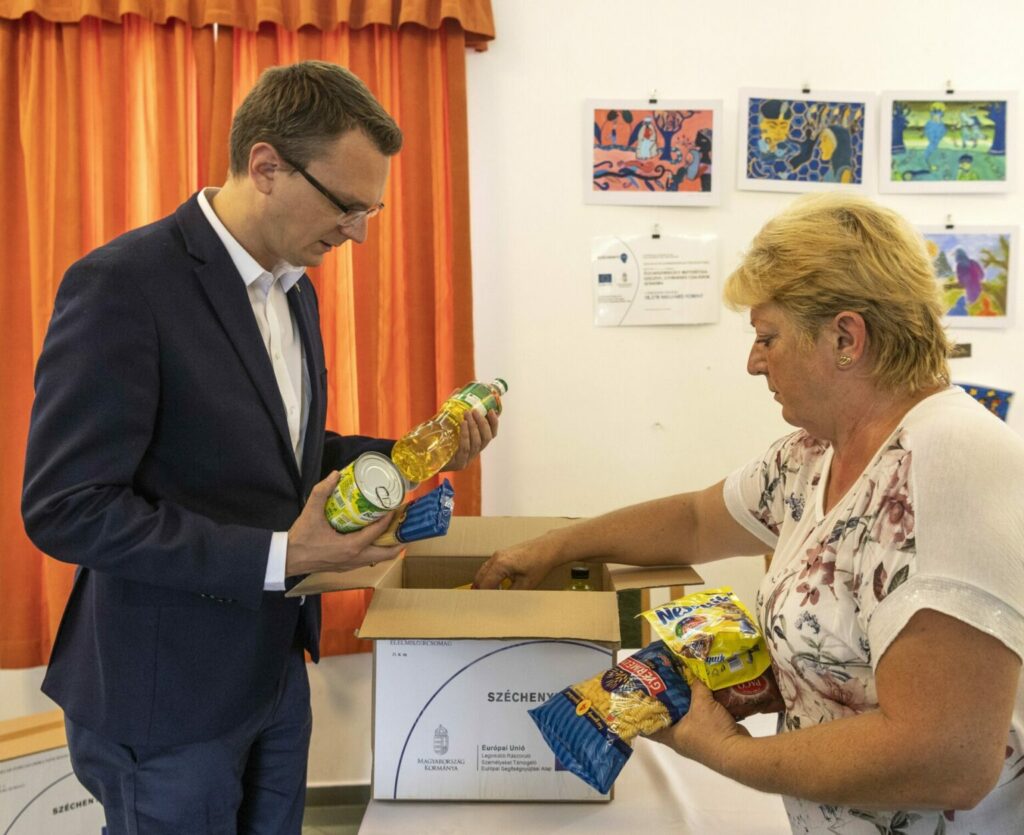The https://english.atlatszo.hu use cookies to track and profile customers such as action tags and pixel tracking on our website to assist our marketing. On our website we use technical, analytical, marketing and preference cookies. These are necessary for our site to work properly and to give us inforamation about how our site is used. See Cookies Policy
UHT milk now costs HUF 820 in parcels for the poor, NAV launches investigation
According to the Directorate-General for Social Affairs and Child Protection (SZGYF), the prices of food packages for the poor include both products and services. They claim, therefore, that the price of the products alone cannot be used as a basis for analysis. The announcement comes after the Public Procurement Arbitration Committee ruled that the SZGYF was in multiple breaches of the law when it excluded the cheapest bid in 2019. Following this, products became exponentially more expensive than both the market price and the price measured by the Hungarian Central Statistical Office (CSO). As a result of our report, the NAV has launched an investigation.
Atlatszo submitted an FOI request to the SZGYF about the 2018-launched program’s expenditure. The bidding companies set a high starting price for the products – not unusual, given the contract’s four-year duration. The framework contract reopened competition, which meant companies submitted new prices for each individual package. The price could not exceed the amount outlined by the framework contract.

The framework contract price and the actual delivery price do not have to be the same – the delivery price can be lower. The 2019 package – which, according to the public procurement, should have been delivered by Natur-Rost Kft – would have cost half of the budgeted amount. Should have, would have – it’s all hypothetical. SZGYF excluded Natur-Rost Kft because, according to the public procurement notice, their price was too low.
We requested the quotes for each procurement and compared the prices with the prices calculated by the CSO. Here are the results:
SZGYF attached a letter to the table they sent to Atlatszo, where they wrote: “The price of food items in the packages is not a meaningful figure and cannot be compared to the retail price. SZGYF does not buy the individual items but purchases the items in a given quantity for delivery to a designated location. Therefore, the package’s price includes services in addition to the actual food items. It includes the following in addition to the products:
- Waste management of bulk packaging of food from different manufacturers
- Price of the cardboard box in which food is stored before it is distributed to users.
- Mandatory images on the box (eg EU logo)
- The cost of packing the food (can involve wages for up to 30 or 40 people)
- Warehouse logistics costs (storage, removal, handling)
- Delivery to over 700 locations (may involve approximately 50 to 70 lorries)
- Drivers’ wages
- Depending on the distribution site, the delivery vehicle may remain on-site throughout distribution (downtime). Distribution can take up to two to four hours on a schedule to avoid congestion.
The amounts seen in the table should be read in conjunction with the above; they do not represent the product’s price in isolation, but the total value of goods and services involved.”
The rejected 2019 Natur-Rost offer
It makes sense; the price covers all goods and services involved in the transaction. It is in this context that Natur-Rost Kft’s bid was excluded in 2019. In a subsequent preliminary settlement request, the company submitted its own budget calculations.
Natur-Rost Kft reminded SZGYF: “contracting authorities are obligated to act in accordance with the principle of sound and responsible fiscal management when using public funds”. They went on to write: “Even conceding the calculation error discovered by the contracting authority, it can be concluded that the contract in question can be undertaken with a profit of HUF 62 million, if not HUF 63 million. It is clear that the difference in our calculations is not enough to warrant an exclusion on the basis that our price is too cheap.”
Their second package had a total value of HUF 673 million, which means Natur-Rost Kft would have earned just below a ten per cent profit. The procurement was valued at HUF 1.4 billion –
so Natur-Rost Kft would have completed the transaction for half the price outlined in the framework contract, with a profit.
The low price was not the only thing irking SZGYF. Natur-Rost Kft wrote, “We calculated our delivery fees with a visit to an average of 1.44 addresses per day. SZGYF dismissed this as physically impossible, and so they dismissed the calculations in their entirety. “And while it is true that 1.44 addresses cannot be visited per day, four addresses can be attended to in three days, and 14 addresses can be attended to in ten days. Our calculations are perfectly reasonable.”
Natur-Rost Kft also questioned how SZGYF calculated the HUF 3,530 delivery fees, as there was no apparent basis for this number. “This amount appeared out of thin air, without any supporting evidence for its reliability,” they wrote. “By contrast, the tables below show that the calculated transport cost for the two types of cargo in our tender, which stood at HUF 750 per box, is accurate,” they continued. “Three quarters of the total cardboard boxes amounts to 65,655 boxes. If two deliveries cost HUF 750, one delivery would cost HUF 375.
“Based on the above, it becomes clear that the contracting authority’s calculations are incorrect, based on false assumptions, and include arbitrary expenditures – therefore, they are inadequate to calculate any truthful costs or profits, and are inadequate to warrant our exclusion.”

KDNP Member of Parliament Bence Rétvári, Parliamentary State Secretary of the Ministry of Human Resources, holds a press conference at the handover of the aid packages donated by the Pest County Branch of the Directorate General for Social Affairs and Child Protection in the framework of the Operational Programme for Supporting Persons in Need in Szob, in front of the József Attila House of Culture and Leisure Centre on 22 June 2020. (photo: MTI/Máthé Zoltán)
Natur-Rost Kft pointed out: “The subcontractor’s transport costs include the cost of packing the goods onto a vehicle, along with the costs of ‘receiving packages at the manufacturer’s premises’ – but it remains unclear what the latter actually means. Manufacturers manufacture the products, not packages – it is the subcontractor who then sorts the products into packages.”
In 2019, Natur-Rost Kft also assumed that the HUF 195 per box packing cost includes the cost of labels, which is paid for by the buyer.
Perhaps most significantly, Natur-Rost Kft did not believe their bid to be suspiciously cheap. “Our price (HUF 5398) was only 10.55 per cent below market price (HUF 6034). According to case law, a 10 per cent deviation gives rise to serious doubts as to whether the contracting authority was justified in even requesting the bidder to explain their pricing,” wrote Natur-Rost Kft.
There are two possible explanations. One – Natur-Rost wanted to suffer a huge loss that would have bankrupted the 1994-founded company. In case this is unlikely, and – just hear us out – it might be, the second explanation is that Natur-Rost Kft could have produced the package for the poor at a profit margin of near-ten per cent, around 50 per cent cheaper than the price of the framework contract.
It’s anyone’s guess, though.
The company was unlawfully excluded
In their request for a preliminary dispute settlement, Natur-Rost Kft accused SZGYF of violating the rules of public procurement on several counts. The Public Procurement Arbitration Committee ruled: “The contracting authority unlawfully requested additional justifications for the tender price.” The committee also “partially upheld the request and annulled the contracting authority’s decision to close the procedure under D.151/41/2019 because
the contracting authority unlawfully declared the applicant’s tender invalid”.
Natur-Rost Kft was eventually contracted, but they did not deliver the package, reportedly due to tight deadlines. SZGYF – with their claims that prices cannot be compared – was also found in breach of the law because it excluded the cheapest bidder. This resulted in soaring prices.
Funnily enough, Natur-Rost Kft was able to win a public procurement contract with the predecessor of SZGYF in 2017, completing the HUF 700 million project without complications. They beat out CBA Kft and Káta-Mill Kft for the priority project RSZTOP-1-15: the purchase of food packages for impoverished families with children.
OLAF does not investigate; NAV does
Momentum representative Lajos Lőcsei inquired about the food packages, funded with EU money, at the Ministry of Interior – where they found nothing out of the ordinary – and also went to OLAF with his concerns.
The EU authority, in charge of investigating the spending of EU money, wrote to the MEP: “Of the supported projects, OLAF investigated RSZTOP-1.1.1-16-2016-0002 in the context of the case OC/2018/0025/A3. OLAF closed its investigation on 8 November 2019 without any further recommendations. The OLAF final report is not public.”
OLAF fails to investigate the RSZTOP-4.1.1 project covered by Atlatszo.
“The article does not mention that the price per package does not only cover the products, but also all of the related costs,” wrote OLAF. But this position is incorrect – our first article on the subject, published in January 2021, noted that, according to the procurement, the logistics per parcel could be covered by HUF 375. But we move on. The current account also includes the exact cost of the packaging, as it also shows that SZGYF presented arbitrarily calculated prices to bidders – giving OLAF plenty of reason to investigate.
While OLAF failed to look into the issue, Hungarian authorities jumped on it. After our May article of this year discussed the clear overpricing, Transparency International (TI) and Atlatszo turned to the Integrity Authority and the National Tax and Customs Administration (NAV).
Arguably, the significant overpricing violates the requirement of sound financial management of the EU budget, and thus endangers the financial interests of the European Union. As a result, we filed a complaint with NAV.
While we are yet to receive any response from the Integrity Authority, the wheels began to turn at NAV. At the end of July, the tax authority informed us that our report was forwarded to the Central Investigation Department. On August 1, we were informed that the Central Investigation Department had launched an investigation into the case.
Translated by Vanda Mayer. The original, Hungarian version of this story was written by Csaba Segesvári and can be found here.
Share:
Your support matters. Your donation helps us to uncover the truth.
- PayPal
- Bank transfer
- Patreon
- Benevity
Support our work with a PayPal donation to the Átlátszónet Foundation! Thank you.
Support our work by bank transfer to the account of the Átlátszónet Foundation. Please add in the comments: “Donation”
Beneficiary: Átlátszónet Alapítvány, bank name and address: Raiffeisen Bank, H-1054 Budapest, Akadémia utca 6.
EUR: IBAN HU36 1201 1265 0142 5189 0040 0002
USD: IBAN HU36 1201 1265 0142 5189 0050 0009
HUF: IBAN HU78 1201 1265 0142 5189 0030 0005
SWIFT: UBRTHUHB
Be a follower on Patreon
Support us on Benevity!

